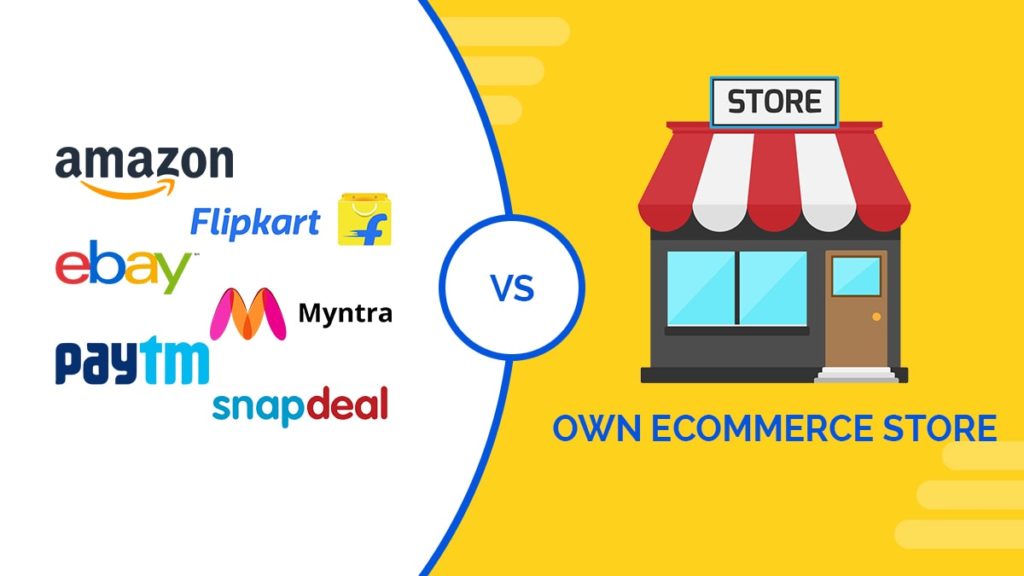Table of Contents
ToggleDifference between an online store and an e-commerce website?
Let’s dive into the difference between an online store and an e-commerce website Since time immemorial, people have gone to shops or sellers to buy something. The trend has changed in recent years with the onset of online stores and e-commerce websites. Now the question is, what is the difference between an online store and an e-commerce website?
While these terms are often used interchangeably, there is a difference between them. The biggest difference between an online store and an e-commerce website is the existence of a mediator. Online stores are shops/brands aimed at providing a similar experience as physical shopping at their store to customers online.
In the case of e-commerce websites, brands do not deal directly with their customers. They list their products on famous relevant shopping sites such as Amazon, Flipkart, etc. Consumers buy these products through third-party retailers, e-commerce websites in this case. Promoting both needs good marketing strategies.
What Is an E-Commerce Store?
First, let us understand what e-commerce is. E-commerce simply means when consumers buy goods and services online through the internet.
An e-commerce store is an online store through which people can shop. Businesses sell their products and services online through e-commerce stores. They list their products on stores like Amazon, Mynta, Nykaa, and Flipkart through which consumers can easily access their products. These stores charge some commission for listing a product on their store from the brand.
One of the primary benefits of using an e-commerce store is brands do not have to pay an exorbitant price for keeping up a separate store online and maintaining it throughout. With small brands, e-commerce stores are a great alternative to creating a personal online store. It helps the consumers in many ways as well, e-commerce stores provide consumers with a wide range of brands to choose from for a particular product.
What Is an Online Store?
An online store refers to putting your products and services from the physical store to online. With the advent of the internet and an increase in the hustle culture where people don’t have time to visit physical stores, online stores serve as an easy and convenient option.
Compared to e-commerce stores which are meant for shopping purposes only, online stores can be used for other purposes such as showcasing products or services, and sometimes even act as a digital brochure.
Brands build online stores to increase their reach. They market their stores online with the help of social media. They implement SEO and SEM to garner the attention of a wider audience base.
One of the main advantages of online stores is personalization. With e-commerce stores, the only thing a brand can do is list its products on the site whereas with online stores, they can give the customers a physical store experience by implementing similar services. They are allowed to be creative and there is no extra commission to be paid to a third party. The consumer directly gets to deal with the brand.
Major Difference Between Online Store And E-commerce Websites
Some major differences between an online store and an e-commerce website are:
- Transaction services: E-commerce stores have a more sought-after payment method through secured payment gateways as many brands trust them with their products. Whereas, online stores may not have that level of secure transactional functionality.
- Services offered: E-commerce websites mainly perform the function of buying and selling of products whereas online stores have a wider scope of services as mentioned above.
- Complexity: E-commerce websites tend to be more complex with a wide range of customization features available to the customers. They have a huge variety of brands to select from. Online stores are simpler as the products and services belong to just one brand making it easier for the customer to browse.
Conclusion
There are multiple differences between e-commerce stores and online stores despite the fact they both function in the online realm, catering to similar services. It usually depends on the needs of the customers as to what they prefer between both. If a customer wants to explore a huge variety of products or services, they visit an e-commerce store. Whereas, if they have a pre-loved brand they’d visit that. Factors such as trust, loyalty, and preference also come to light in such instances.
